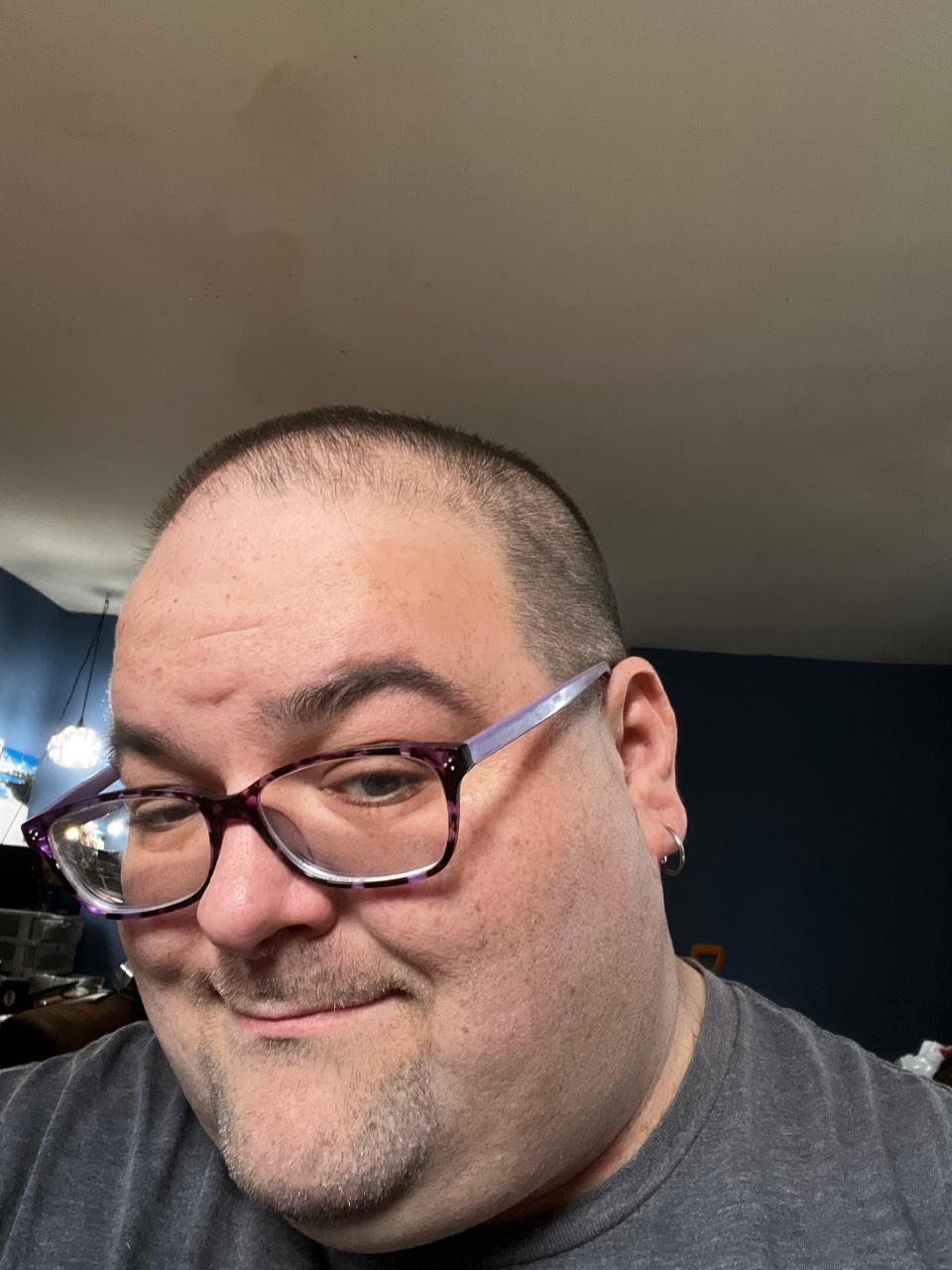As Supreme Court gears up to rule on student loan cases, Americans are split on debt forgiveness
- Oops!Something went wrong.Please try again later.
- Oops!Something went wrong.Please try again later.
Kandra Brooks never got around to finishing her bachelor’s degree but still owes $250 a month for the debt she took out to attend college. The 31-year-old dreads the thought of the payments, which have been on pause since the early days of the coronavirus pandemic, resuming.
“There were times when it was hard for me to do daily stuff – personal care, household things – because I had to factor in my loans,” said Brooks, who lives in the Los Angeles area and makes $61,000 a year as a unit manager for a large hospital system. The amount she owed on her income-based repayment plan would periodically change, too. “The increase, sometimes it’s unexpected, so then I would have to refactor that in.”
Even though she identifies as Republican, a party whose attorneys general are seeking to stymie President Joe Biden’s plan for debt forgiveness, Brooks strongly supports such relief and other efforts to make college more affordable.
She is among the nearly half of all Americans – including the vast majority of those with student debt – who support the plan, which would relieve up to $20,000 for borrowers who make less than $125,000. As with Brooks, half of borrowers want forgiveness to go further.

But, as demonstrated in a new USA TODAY/Ipsos poll, solid shares of Americans, particularly those without loans, oppose such forgiveness and other proposals to bring college costs down.
“The American public and student loan holders continue to be in two very different places when it comes to student loan forgiveness and their willingness to support various proposals on the table,” said Mallory Newall, vice president of public polling at Ipsos.
The poll, which comes two months after the Supreme Court heard arguments around student loan debt forgiveness, was done in mid-April among a representative group of 1,029 American adults, including an oversample of student loan borrowers. The poll had a margin of error of plus or minus 3.2 percentage points for all respondents and 5.2 percentage points for those with student loans.
'Debt and no degree' Biden cancels as much as $20K in student loan debt
Major takeaways:
47% of Americans support Biden’s forgiveness plan in its current form, 41% oppose it and 12% are undecided. Just a third (35%) want the court to strike the plan down.
Unsurprisingly, the vast majority (83%) of student loan borrowers support Biden's plan. They’re also more plugged into legal developments concerning Biden’s plan, with 50% saying it doesn’t go far enough. Notably, however, about 3 in 4 people who support the student loan debt forgiveness plan don’t have any student loan debt themselves.
More than half of Black and Hispanic respondents were in favor of the current plan to discharge debt, compared with about 2 in 5 white respondents.
Support for student loan discharges fell when pollsters asked about plans that would eliminate debt for more people regardless of their incomes: 39% of Americans support wiping all student loan debt for those earning less than $125,000 a year individually. Fewer than 1 in 3 Americans support erasing all student loan debt regardless of income, as did 57% of borrowers specifically.
Even if student loan forgiveness fails, you can still get student loan forgiveness in these states
Borrowers say loan payment pause has improved their mental health
Former President Donald Trump started the student loan repayment moratorium in March 2020, at the onset of the coronavirus pandemic, though his and Biden's administrations have since extended it. The moratorium frees borrowers from the obligation of their loan payments while setting interest rates on federal student loans at zero percent. The pause could last as late as September.
In the USA TODAY/Ipsos poll, more than half – 55% – of student loan borrowers said the pause has improved their mental health. Similar rates said they’ve struggled to make repayments in the past and have delayed doing so during the pause because they hope the debt will be forgiven.
A reprieve: How the student loan payment pause changed people’s lives
Allison Fuller is a New York City-based freelancer in film and TV who made just $49,000 last year. Fuller, 26, stopped looking at how much she owes once the pause kicked in, but she estimates her monthly payment is now about $200. Her total loan amount is a little more than $6,000 – smaller than that of the average borrower yet an overwhelming figure for Fuller, who attended New York University on a full-tuition scholarship but took out federal undergraduate and Parent PLUS loans to cover other expenses.

"It would give so many people a leg up to not have to worry about that debt on top of everything else," she said. “I’m working 60 hours a week and I'm barely making ends meet as it is. ... I am working hard. It’s just that this country is making it impossible to afford a decent lifestyle."
Will your debt be forgiven? Debt relief will change the lives of some with student loans, but fall short for others.
Ineligible for – but still supportive of – debt forgiveness
When Kelly Patterson, 26, took out loans at 17 to attend college in New York, she “couldn’t really fathom how much money I was going to have to borrow over four years,” she said. "It was a decision that I made before I had a lot of financial literacy, and somewhat under duress." Patterson quickly “got spooked by the amount of debt” she faced at a private university and transferred to a public institution.
All in all, the aerospace engineer took out $20,000 for her undergraduate studies and another $20,000 for her master’s. Graduate degrees are a prerequisite in her profession.
Patterson now makes more than the maximum salary eligible for Biden’s forgiveness plan. Still, she supports it and other plans that would relieve the burden on students and keep the skyrocketing costs of college in check.

“I would really like to see it taken a step further and have most if not all student debt erased,” Patterson said. She'd also like there to be be more awareness at the outset about the true cost of higher education, particularly at elite private colleges, and the implications of that debt. "One of the things I always think about is the social pressure around going to a higher-priced, big-name university to get into certain careers," she said.
Carlos Madrid, 42, wouldn’t be eligible for Biden’s plan either but similarly supports it. Madrid, an independent voter and a stay-at-home dad, has student loans for a college education he never completed.
He consolidated his student debt, which would cost $500 a month if repayments weren’t on pause, into private loans, which means they wouldn’t be relieved even if Biden’s plan survives.
How did they do that? Millions of borrowers have had billions in student loan debt erased, and there's more to come.
Still, “I would just get rid of student debt and it would lift a bunch of people out of poverty,” he said. “All these old people against debt forgiveness are like, ‘Well, I just got a part-time job and went to college.' You can’t do that anymore.”
While the mass forgiveness plan is held up in court, the Biden administration progressed on other avenues of relief. Just this week, the Education Department announced it has forgiven $42 billion in student loan debt for people who work in public service. The federal government has long guaranteed some student loan relief for people in certain professions, such as teachers, nurses, social workers, social workers and servicemembers, but bureaucratic obstacles and other hold-ups meant many couldn't secure the forgiveness.
The administration has taken various measures to address those kinks in recent months, including regulatory changes, and said more than 615,000 Americans have seen or will soon see their loans discharged as a result.
Meanwhile, Republicans in Congress are trying to stamp out the mass student loan forgiveness through legislative action. Citing a Government Accountability Office report, conservative lawmakers argue the plan should have been submitted to Congress before it was enacted. To that end, the House committee on education planned a markup on Wednesday of a joint resolution that would nullify the mass forgiveness plan. Rep. Virginia Foxx, R-N.C., and chair of that committee, has long opposed Biden’s plan to discharge billions in student loan debt.
“Since his first day in office, President Biden has worked to circumvent the courts and congressional authority to provide backdoor free college through the student loan program,” Foxx said. “The president is leveraging the nation’s financial future with his radical agenda that, taken together, could end up costing taxpayers nearly $1 trillion.”
Free community college a winning issue
While Americans are split on the question of forgiving student loan debt en masse, a majority do favor reducing college costs on the front end. The poll found that roughly 65% favored the federal government making community college free for two years.
What happened to Biden's free college? Cutting cost of higher ed out of feds' reach
“One thing that (many Americans) do agree on is that a long-term structural change – that is, making college higher education more affordable – is a better path forward than a short-term fix,” said Ipsos’s Newall.
The poll’s findings echo a USA TODAY/Public Agenda survey in June 2022 that found most Americans, whether they identify as Democrats, Republicans, or Independents, favored making community college free for students. That poll also found Americans across the political spectrum were in favor of increasing taxes on those making more than $500,000 a year to subsidize higher education.
Is college worth it? Americans say they value higher education, but it's too expensive for many
Biden campaigned on providing two years of free community college. It was even briefly part of his massive social safety net package, though it was ultimately scrapped. The White House proposed spending $90 billion on free community college as part of its 2024 budget proposal, though that effort is unlikely to make it through a divided Congress.
Brooks wonders if she would have been able to finish her bachelor’s if her community college education had been free.
She paid for her liberal arts associate’s degree entirely out of pocket. The classes, not to mention the books, really added up. “If I would have been able to just do that freely, it would have made the process so much easier,” she said. “I would have accomplished so much more.”
Student loan forgiveness Is it fair to those without college degrees?
Contact Alia Wong at (202) 507-2256 or awong@usatoday.com. Follow her on Twitter at @aliaemily. Contact Chris Quintana at cquintana@usatoday.com or via Signal at 202-308-9021.
This article originally appeared on USA TODAY: Student loan forgiveness: USA TODAY/Ipsos poll shows Americans split

